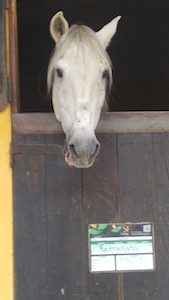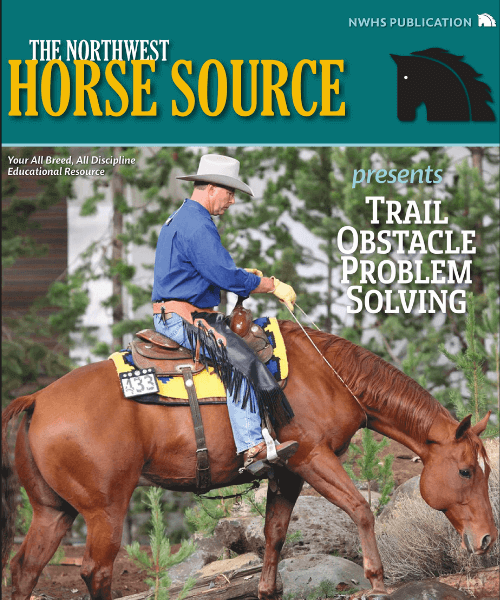Be Prepared for the Predictable Changes of Aging
by Dr. David Sauter DVM

Horses are living longer and healthier lives. While humans are considered to be seniors at 65 years and older, when are horses senior? It helps to have a basis to compare “human years” to “horse years” at our respective stages of life:
- Newborn foals are comparable to 2 or 3-year-old children (except for their dependency on nursing). Horses are up on their feet running around and following their mothers within minutes of birth.
- As yearlings, horses are equal to 12-year-old humans.
- By the end of the second year their maturity is equal to another 7 human years, making them similar to an 18 or 19-year-old human.
- Each of the next 3 years is roughly equivalent to 4 human years.
- Add 2 ½ years for each subsequent year.
Using this method, a 17-year-old horse would be similar to a 65-year-old person, so horses in their late teens are considered senior. Extending the comparison out further, a 20-year-old horse would be over 72 human years and a 30-year-old would be over 97 human years—an impressive achievement by anyone’s standard! Although this method is not perfect, it gets us in the ballpark for comparison.
Aging results in a decline of bodily functions. Recognizing the special health issues senior horses face enables us to help them cope with these changes.
Lameness. Wear and tear on joints, tendons, and ligaments leads to generalized stiffness and soreness. Previous injuries or lameness problems can accelerate these changes in the rest of the body. “Motion is lotion” can be a useful motto to follow. Regular safe turn-out and low-intensity exercise can be extremely helpful in promoting strength, flexibility, coordination and mental sharpness while reducing boredom. This also encourages better muscling in lean horses and weight reduction in the overweight horse. In some cases, pain medication is indicated. Elevating feed for horses with front limb and/or neck pain and placing hay in multiple corners of the stall or paddock will encourage the horse to move more throughout the day.
Weight Problems. Easy keepers struggle with excess weight even more in their senior years. Exercise and nutrition are important for managing these horses, but get them checked for metabolic issues and Cushing’s disease also. Other senior horses suffer from the opposite problem—being too thin. Some older horses lose the ability to properly digest, absorb and assimilate their food and require special feed.
Dental Problems. Horses have “hypsodont” teeth that will eventually wear out if they live long enough. Broken teeth, sharp points, uneven wear, and tooth loss can cause pain and infection and interfere with proper chewing. Regular dental care can help to both prevent and to cope with problems that develop along the way.
Water. With their stiffness issues, easy access to clean, fresh water is even more important with our seniors, especially in freezing cold weather. The cold brings on even greater stiffness and more reluctance to trudge over uneven frozen ground with sore feet to get to the water. We see more impaction colic with seniors in cold weather. If they are offered warm water in cold weather, studies show they will drink more.
Cushing’s Disease. There has been an exponential growth in our awareness and understanding of this disease. Cushing’s disease is related to many of the problems we see in senior horses, such as chronic laminitis, loss of muscle mass, hair coat problems and weakened immune systems. Our ability to diagnose and treat the disease at earlier stages has greatly improved.
Heaves. Environmental “triggering factors” such as mold and dust cause small airways of the lungs to produce excess mucus and airway constriction, a huge double whammy. Heaves is very similar to asthma in humans. The extra effort it takes to move air through these plugged, narrow airways leads to growth of larger abdominal muscles, creating the characteristic “heave line” we see in advanced cases. Treatment is focused on reducing exposure to triggering factors, medication to reduce sensitivity to triggering factors, and medication to reduce mucus production and to open airways.
Weakened immune system. This increases susceptibility to and slows recovering from infections. Regularly grooming is great for bonding, detecting problems and will stimulate the immune system to function better.
Sleep. Many senior horses that cross the threshold of 30 years of age have maintained the ability to lie down to sleep. REM sleep, vitally important for good health, can effectively occur only if the horse is able to lie down. The continued ability to safely lie down and sleep is a sign that things are still working pretty well. Having a clean, dry, and warm area for rest can be helpful.
Yearly exams. Vet exams and laboratory tests can help identify and treat health problems.
Reaching senior years does not necessarily equate with frailty, weakness, or other health problems associated with geriatric patients. Senior horses are continuing to be active and serviceable into their later years. Our seniors are valued for their temperament, skill, ability and as members of our families. Attention to the special needs of our seniors will help make their golden years happier and healthier!
Originally Published December 2017 Issue

Dave Sauter is a Minnesota native and graduated from the University of Minnesota in 1987. Following graduation he interned at Rood and Riddle Equine Hospital in Lexington, Kentucky. After this internship, he continued to work exclusively with horses for another five years in Kentucky before moving out West and joining Kulshan Veterinary Hospital in Lynden, WA. He is a member of the AAEP, AVMA and the WSVMA. For more information about Kulshan Veterinary Hospital call 360-354-5095 or email drkulshan@msn.com. www.KulshanVet.com







